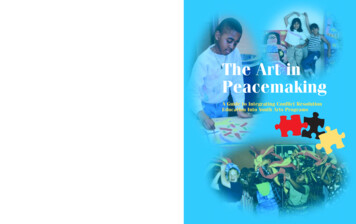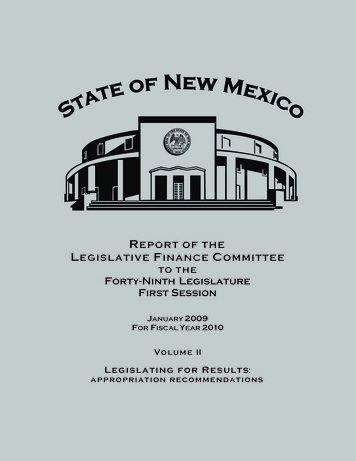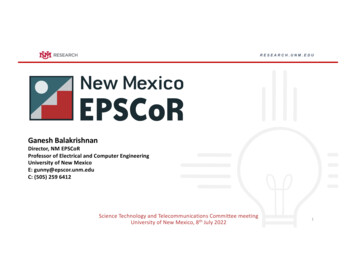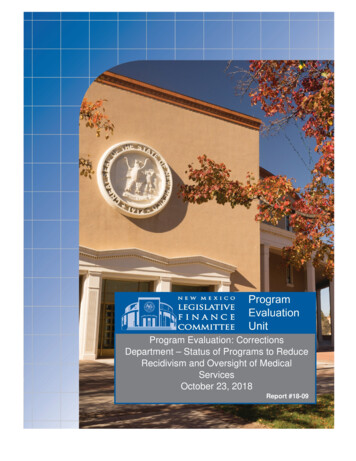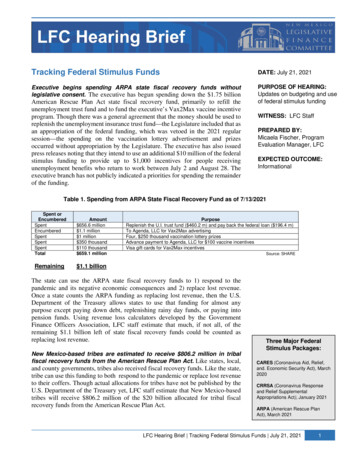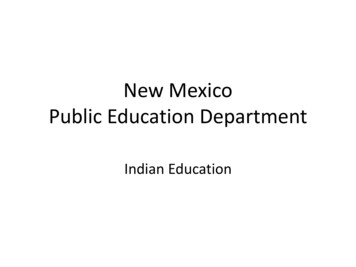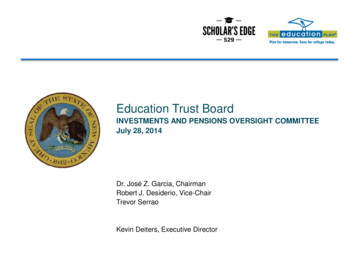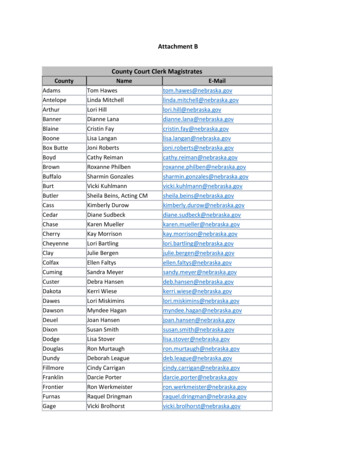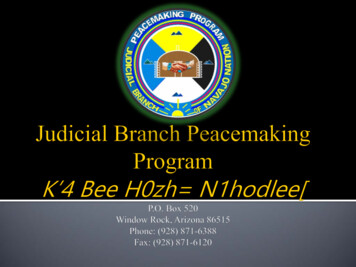
Transcription
Peacemaking Program Program Coordinator Roman Bitsuie Bicultural Training Manager Roger Begay Traditional Din4 Researcher Joseph Sandoval Community Development Specialist Office Technician Dawnell Begay
PeacemakingProgram 12 Districts Alamo/T0hajiileeh Aneth Chinle Crownpoint Dilkon Dzi[ Y7jiin Kayenta Traditional ProgramSpecialists (TPS)PeacemakersRamahShiprockTuba CityWindow Rock
The sole goal of peacemaking is “an1h00t’i’hasht’44 dooln77[ d00 h0zh0ogo k’4nahodlee[“ Peacemaking is a process which encouragesand empowers the Navajo people to resolvetheir own problems, stressing individualrespect, responsibility and accountability. Peacemaking provides traditional Din4teaching concepts of K’4 and H0zh0.
Traditional RestorativeJustice Systems: Hane’doo K’4 dooHozh j7i Na’nitinBIA Court of IndianOffenses 1892 to 1959Exposure to AngloCourt Systems from1864 to 1868Navajo Tribal CourtSystem established 1959Creation of the NavajoNation Council 1921Navajo Nation Council amend Title I ofthe Navajo Nation Code: Recognize theFundamental Laws of the Dine”November 2002Peacemakingacknowledged 1982PeacemakingGuidelinescreated 2004
Peacemaking goes back to the beginning oftime. Traditional journey narratives revealswhen the holy people traveled through the fourworlds, they encountered problems. Theproblems were resolved by “talking things out”by using prayers, songs and offerings. Theseremedies are embedded into traditional Din4ceremonies and teachings.
Diyin Dine’4 Bits’33d66’Fundamental Laws 1. Diné Bi Beehaz'áanii Bitse Siléí --Declaration of the Foundation of DinéLaw 2. Diné Bi Beenahaz'áannii 3. Nahasdzáán dóó Yádi[hi[ Bitsąądęę Beenahaz'áanii--Diné NaturalLaw 4. Diyin Bitsąądęę Beenahaz'áanii--Diné Traditional Law 5. Diyin Dine'é Bitsąądęę Beenahaz'áanii--Diné Customary Law 6. Diyin Nohookáá Diné bi beenahaz'áanii--Diné Common LawNohook11’ Diyin Dine’4Forefathers/GrandmothersBefore European ContactBefore Hw44ldiIntroduction of Western Law1982 – Navajo Peacemaking Court Manual2004 – PM Guide Lines
TheNavajo Court System was established in1959, Navajo Judges implemented traditionalconcepts and beliefs in their ruling. The Navajo Nation Peacemaking Programwas officially established within the tribalcourts in 1982. In 2001 Navajo Nation Council passed JCAP14-00 the Enabling Legislation whichestablished the Peacemaking Division withinthe Navajo Tribal Courts.
1984 - 20042004 - 2012Current
Navajo Nation Council amended Title 1 of the Navajo NationCode with Resolution CN-69-02 which “recognized theFundamental Laws of the Dine”The resolution recognized four distinct forms of Fundamental Law: Din4 Natural Law – Nahasdz11n d00 Y1di[hi[ bits’33d66 beehaz’1anii Din4 Traditional Law – Diyin bits’33d66 beehaz’1anii Din4 Customary Law – Diyin Dine’4 bits’33d66 beehaz’1anii Din4 Common Law – Diyin Nohook11 Dine’4 Bi Beehaz’1anii
Natural LawNahasdz11n d00 Y1di[hi[ bits’33d66beehaz’1anii
Values and Practices The foundation forconfidence and selfsufficiency When a baby is born:The cord is cut,the mid-wife holds on tothe cord until the placenta comes out. The placenta isput sacredly put away with songs and prayers. The goals and focuses are to keep the child young as long as possible.After birth the baby is wrapped in cloth. Water and corn pollen is put intotheir mouth and their head is positioned towards the fire. The childremains toward the fire for four days. This is a symbol of baptismintroducing the child to nature fire.
Celebrations: Baby’s 1st laugh: Baby givesaway salt and food. The salt is forthe child to reach old age. Thefood given away is for lots ofkinship, respect, and love for thebaby. Puberty: Parents conditioning andpreparing their child for life’schallenges. Marriage: Wedding basketceremony to become a parent,grandparents, great-greatgrandparents Celebrating children andgrandchildren
Common law in the 1800’s were differentfrom today.LanguageDiversityRelearning ourcultural practicesResponsibilities toteach and help thepeople we serve.
Navajo Nation Judicial BranchChief JusticeSupreme CourtRamah District CourtAdministrative Office of the CourtsDilkon District CourtTuba City District CourtWindow Rock District CourtPeacemaking ProgramAneth District CourtChinle District CourtAlamo/To’hajiilee District CourtKayenta District CourtShiprock District CourtCrownpoint District CourtDzi[ijiin/Pinon District Court Each District Court has a Family Court, Probation and ParoleServices and a Peacemaking Program.
Navajo Nation Judicial BranchChief JusticePeacemaking ProgramPeacemaking CoordinatorBi-cultural Training ManagerDin4 Traditional ResearcherOffice Technician The purpose of the program is to provide technical assistance, training,policy development, curriculum and education to support DistrictTraditional Program Specialists, Navajo Courts and other branches ofNavajo Nation Government.
Resolution of the Navajo Nation Council CJ-7601 Amending Title 7, Chapter 3 of the NavajoNation Code By Incorporating EnablingLegislation for the Navajo NationPeacemakingThe Navajo Nation Council amended Title 7,Chapter 3 of the NNC by adding subchapter10, Establishing Navajo Nation PeacemakingDivision. Sections 409, 410, 411, 412, 413,414.
Peacemaking Program encourages peopleto solve their own problems by opencommunication through respect,responsibility and good relationships. Encourage people to be self sufficientand independent. The concept of Peacemaking or K’4 BeeH0zh N1hodlee[ goes back to thebeginning of time and is embedded inthe journey narrative.
To promote a non-adversarial forum of solvingdisputes, promote counseling services to clients of theNavajo Nation Courts; to assist the Navajo NationCourts when requested and to make recommendationson sentencing.To provide education and training on the FundamentalLaws of the Din4 to peacemakers, individuals andorganizations and communities;To provide support and technical assistance toTraditional Program Specialists and Peacemakers.To provide research, development, and learning of theFundamental Laws of Din4.
To provide education on other Navajoaccepted beliefs in support of judicial andcommunity programs.To provide problem solving assistance topeacemakers, judges, court staff, and othersconcerning the peacemaking process.Most of all, peacemaking is intended topromote healing and reestablish harmonyamong those persons participating inpeacemaking.
The Navajo Nation Peacemaking Programshall have the authority and power toundertake the following functions and duties. To conform the procedures of Hozh00jiNaat’1anii on traditional Navajo Hozh00jiconcepts, including K’4, clanship, and otherprinciples of Navajo Culture, traditions, and otherNavajo accepted beliefs and establish standards,principles and procedures for that process.
To maintain a list of peacemakers and provide technicalsupport to peacemakers and to facilitate the conduct ofpeacemaking. To periodically evaluate the techniques of peacemakersand the peacemaking process. To authorize peacemakers to enter into fundingagreements with the Judicial Branch for mileage andtraining. To perform other functions and duties that are inaccordance with Navajo Nation law and purpose of theNavajo Nation Peacemaking Program that will promotethe practice of peacemaking.
A way of life for Din4.Foundation of the Din4 TeachingsK’4 conceptsSustain Din4 traditional values, principals, standardsLanguageK’4 Bee H0zh N1hodlee[Meaningful Counseling & Sincerely Engaging with ourrelatives.
Parties submit written request toone of the twelve JudicialDistrict’s Peacemaking ProgramOffices Pay 80.00 Peacemaking Fee PMP TPS will appoint qualifiedPeacemaker PMP TPS will schedule time anddate of session Submit Session
Begins with a prayerIntroduction of parties and summary of problemIdentifying the problem begins with asking all participants H00ch-’ / ‘An1h00t’i’ “Haash hoot’88d, H1adish 1hoot’88d, H1aish bi[‘1h00t’88d?” “what is the problem?” “what is the cause of the problem?”When these questions can be answered then a plan of action toresolve the issue is initiated. This action is put in a Peacemaking Agreement, which can berecognized by the Navajo Nation Court
Safe School Project: Collaboration efforts includesproviding Peacemaking services to 5 schools on theNavajo reservation. This project is funded by federalgrants: Children are given the opportunity to voice theiropinions and express themselves Peer Counseling is also provided for children toresolve disputes among themselves
School Truancy Officers and Principles refer thecases to PeacemakingTuba City District Peacemaking Program dealswith an average of 10 truancy cases per month Most cases are from local High Schools Tuba City High School Grey Hills High SchoolCase backlog occurs at the end of 9 weeks or at theend of each semesterCases are reviewed at 30, 60 and 90 days to ensurePeacemaking Agreements are respected
Parent and child do not honor the PeacemakingAgreement TPS refer the case back to the courts and goes to theprosecutor’s office Prosecutor’s office requires documentation that thePeacemaking session has attempted to address theproblemSubstance and Alcohol abuse is sometimesevident both in the child and the parent Children lack support from their families Non compliance Prosecution
With the help of AssociateAttorney Josephine Foo and ChiefJustice Herb Yazzie, thePeacemaking Program has beenable to secure a grant with theOffice of Juvenile Justice andDelinquency Prevention for 450,000. This grant will be usedto promote the Peacemaking YouthEducation and ApprenticeProgram from 2009 to 2013.
The PYEAP has three main goals: Establish curriculum for traditional teachings whichblends Navajo Peacemaking and Western best practicesand therapies for dispute resolution, violence preventionand community building Provide for Navajo Peacemakers to work individuallywith delinquent and at risk youth and their familiesthrough the provision of traditional teachings andcounseling Establish a youth peer apprentice peacemaker program
The Peacemaking YouthEducation and ApprenticeProgram (PYEAP) willconcentrate on providingpreventive and interventionservices to at-risk and courtinvolved youth. The focus willbe directed to 6th to 12th graders,youth between the ages of 11 and17.
Focus will be geared towardteaching leadership skills tostudents: promote decision making skills enhance knowledge on NavajoLanguage and Culture improve communication Foster conflict resolution
Tuba City District Peacemaking Program deals with an average of 10 truancy cases per month Most cases are from local High Schools Tuba City High School Grey Hills High School Case backlog occurs at the end of 9 weeks or at the end of each semester Cases are reviewed at 30, 60 and 90 days to ensure
